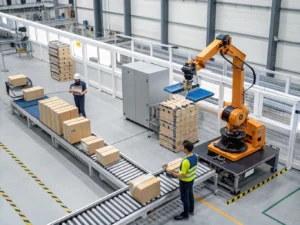Beyond AI: The Next Frontier of DeepTech Investments That Could Reshape Industries
or similar and then proceed with the content.
Navigating the Future: Understanding DeepTech Investment Trends
Are you ready to ride the wave of the next technological revolution? The landscape of investment is shifting dramatically, with DeepTech Investment Trends taking center stage. But amidst the buzzwords and complex innovations, it can be challenging to discern genuine opportunities from fleeting fads. What are the core drivers fueling this transformation, and how can investors and businesses position themselves for success? This comprehensive guide dives deep into the world of DeepTech Investment Trends, exploring everything from groundbreaking advancements to practical strategies for navigating this exciting, yet often intricate, arena.
Key Concepts & Trends

The term DeepTech isn't just a buzzword; it signifies investments rooted in significant scientific and engineering breakthroughs. These are companies tackling fundamental challenges across various sectors – from healthcare and energy to artificial intelligence and advanced materials. Unlike traditional venture capital focused on earlier-stage ideas, DeepTech often involves lengthy research and development cycles, requiring substantial capital and a long-term perspective.
Several key trends are shaping the current DeepTech Investment Trends:
- Artificial Intelligence (AI) & Machine Learning (ML): AI isn’t just about chatbots; it's permeating every aspect of industry. We're seeing advancements in generative AI, computer vision, and natural language processing driving innovation in fields like drug discovery, autonomous vehicles, and personalized education. For instance, companies leveraging AI for protein folding (like AlphaFold) are drastically accelerating drug development timelines.
- Biotechnology & Genomics: Revolutionary advancements in gene editing (CRISPR), personalized medicine, and synthetic biology are driving breakthroughs in treating diseases, enhancing human capabilities, and developing sustainable solutions. Investment in this space is surging, as evidenced by the growth of gene therapy companies.
- Quantum Computing: While still in its nascent stages, quantum computing holds the potential to solve complex problems intractable for classical computers. This has profound implications for cryptography, materials science, and drug discovery. Early-stage investment here is high-risk, high-reward.
- Sustainable Technologies: Driven by climate change concerns, investments in clean energy (solar, wind, energy storage), carbon capture technologies, and sustainable materials are booming. Companies developing next-generation batteries and green hydrogen solutions are attracting significant funding.
- Advanced Robotics & Automation: Beyond manufacturing, robotics are expanding into healthcare (surgical robots), logistics (autonomous delivery), and agriculture (precision farming).
Data & Market Insights
According to a recent report by CB Insights, global DeepTech funding reached $56.7 billion in 2023, demonstrating continued strong investor interest. This represents a significant increase compared to previous years, highlighting the growing recognition of Breakthrough Technologies. McKinsey’s research on the next wave of DeepTech innovation identifies areas like AI, biotechnology, and quantum computing as pivotal drivers of economic growth.
[Insert Infographic here: A bar chart showing DeepTech investment growth from 2018-2023, segmented by industry (AI, Biotech, Quantum, etc.)]
The market isn't homogenous. Within DeepTech, different areas exhibit varying levels of maturity and investor appetite. For example, while AI funding remains robust, quantum computing investment is still largely confined to early-stage companies and research institutions. This highlights the need for investors to conduct thorough due diligence and understand the risk profile of each sector.
Smarter Strategies & Alternatives
Investing in DeepTech isn't a one-size-fits-all approach. Here are some strategies for navigating this complex landscape:
- Venture Capital Funds Specializing in DeepTech: These funds have the expertise and network to identify promising DeepTech startups.
- Angel Investing Platforms: Platforms connecting investors with early-stage DeepTech ventures. (Examples: Gust, AngelList).
- Corporate Venture Capital (CVC): Large corporations are increasingly investing in DeepTech to gain access to innovative technologies.
- Impact Investing: Align investment goals with positive social and environmental outcomes, which is particularly relevant within the sustainable technologies sector.
- Syndication: Pool resources with other investors to diversify risk and access larger investment opportunities.
Use Cases & Applications
The impact of Breakthrough Technologies is already visible in numerous real-world scenarios:
- Healthcare: AI-powered diagnostic tools are improving disease detection accuracy and speeding up treatment. Personalized medicine, enabled by genomics, is tailoring therapies to individual patients.
- Energy: Advanced battery technology is driving the adoption of electric vehicles and enabling more efficient energy storage.
- Manufacturing: Robotics and automation are increasing productivity and reducing costs in factories.
- Finance: Blockchain technology is revolutionizing financial transactions, enabling greater transparency and security.
- Agriculture: AI and sensor technologies are optimizing crop yields, reducing water consumption, and minimizing the environmental impact of farming.
Startups like CTRL-Labs (neurotechnology focusing on brain-computer interfaces) and Moderna (mRNA vaccine development) exemplify the transformational potential of DeepTech.
Common Mistakes to Avoid
- Lack of Technical Due Diligence: Failing to thoroughly understand the underlying science and technology is a common pitfall. Invest in teams with strong scientific backgrounds.
- Overestimating Technological Readiness: DeepTech often involves longer timelines to commercialization. Don't bet on premature breakthroughs.
- Ignoring Regulatory Hurdles: Many DeepTech sectors, particularly healthcare and biotechnology, face stringent regulatory requirements.
- Underestimating Capital Needs: DeepTech companies often require significant capital to conduct R&D and scale operations.
Maintenance, Security & Long-Term Planning
For those investing in companies building this next generation of solutions, consider these aspects:
- Cybersecurity: DeepTech companies handling sensitive data (e.g., healthcare, finance) must prioritize robust cybersecurity measures.
- Intellectual Property (IP) Protection: Strong IP protection is crucial for maintaining a competitive advantage.
- Scalability: Ensure the technology is scalable to meet growing demand.
- Regulatory Landscape: Stay informed about evolving regulations and compliance requirements.
- Portfolio Diversification: Spread investments across multiple DeepTech sectors to mitigate risk.
Summary & Key Takeaways
The DeepTech Investment Trends are reshaping our world, offering unprecedented opportunities for growth and innovation. While navigating this landscape requires careful consideration and due diligence, the potential rewards are significant. By understanding the key trends, conducting thorough research, and employing smart investment strategies, investors can position themselves to capitalize on the next wave of technological advancement.
What are your thoughts on the future of DeepTech? Share your insights and experiences in the comments below!
FAQs
- Is it too late to invest in crypto? While the crypto market has experienced volatility, the underlying blockchain technology and DeFi (Decentralized Finance) remain promising areas of innovation. However, thorough research and risk management are essential.
- How can small businesses use AI? Small businesses can leverage AI through readily available tools for marketing automation, customer service (chatbots), data analytics, and process automation.
- What tech stacks scale best? Cloud-based architectures (AWS, Azure, Google Cloud) and containerization technologies (Docker, Kubernetes) are often preferred for their scalability and flexibility.
Share this content:












Post Comment